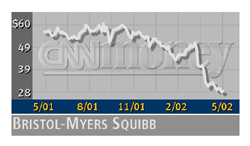
NEW YORK (CNN/Money) -
Bristol-Myers Squibb is battered black and blue, and it just got punched in the gut again. But one industry watcher thinks the drugmaker can retrace its way back from a series of management missteps and effect a turnaround down the road.
A lethal mix of bloated inventory, an aging product pipeline, stiff competition for its top-selling brands from generic drugmakers, forced Bristol to reduce its earnings estimates twice in four months.
Turmoil at home ensued last month when two of the company's top executives -- including its chief financial officer-- left after Bristol posted a deep decline in its first-quarter earnings, as the combined sales of three of it key drugs -- Taxol, diabetes treatment Glucophage, and anxiety medicine Buspar -- fell 90 percent.
In response to the company's poor performance, Chairman and CEO Peter Dolan assumed direct control of the company's global pharmaceutical business and
 |
|
| Stephan Klaffke, fund manager, USAA Stock Income Fund. |
But the pressure continued to mount on Bristol this week. Abbott Laboratories and NaPro BioTherapeutics said late Wednesday they received U.S. Food and Drug Administration approval to market injectable paclitaxel-- the generic equivalent to Bristol's Taxol, the leading anti-tumor treatment for breast and ovarian cancer. Paclitaxel is the most widely used anti-cancer drug in the United States.
Still, Stephan Klaffe, manager of USAA Stock Income Fund, offers a 12-month time frame within which he anticipates Bristol will sort out its inventory problems and management crises. He's even optimistic that the company will eventually outperform the sector.
Klaffe calls Bristol a "show me" stock with a lot to prove to its investors. A possible takeover attempt can't be ruled out, Klaffe says, if management can't back up the quick fix remedies with longer-term solutions.
More from Klaffe on his top stock pick:
Bristol is currently trading at about half its 52-week high of $60. What do you like about Bristol?
We like Bristol at these levels due to its current valuation. Based on estimated earnings for 2003, Bristol is valued at a 25 percent discount to the large-cap pharmaceutical sector.
The company has been punished for a number of missteps made by management over the past year as well as some poor results in its new product pipeline. At this price, the risks are factored into the stock, and as some of the past years' mistakes are corrected Bristol should begin to close the valuation gap.

It appears at this point that Bristol is getting zero credit for its product pipeline. It is true that one product, Erbitux, has been delayed by at least a year and that Vanlev, a new hypertension drug, will not meet prior expectations. But they will be additive to the top line at some point.
The company also has a new schizophrenia drug, Aripiprazole, which should be launched later this year. We have not seen all of the data yet, but Bristol has been positioning the drug as having equal efficacy to Zyprexa and Geodon without the weight gain and cardiovascular side effects.
It also appears that investors are overlooking the growth prospects of Plavix, an antithrombotic drug, which will see increased use following a study published last year, and the benefits seen when used in conjunction with the new drug-eluting (absorbing) stents that will be entering the U.S. market in the first half of 2003.
Who are the competitors and what makes it a "winner" in the sector?
Bristol competes with all of the major pharmaceutical companies -- Pfizer (PFE: Research, Estimates), Pharmacia (PHA: Research, Estimates), Merck (MRK: Research, Estimates), Wyeth (WYE: Research, Estimates), Eli Lilly (LLY: Research, Estimates) and Schering Plough (SGP: Research, Estimates) -- but the amount of competition varies on a product line basis.
We believe that the shares of Bristol will outperform the industry as management regains some of the lost credibility. This will take time, but over the next 12 months we would expect to get past the wholesale inventory issues that led to the latest round of earnings revisions.
Also, the company will be able to show that the expectations for the new products, although down from prior estimates, are somewhat greater than zero.
As is typical in the market, investors' perceptions typically move to the extreme whether it be positive or negative. Currently, we believe that this sentiment is as far down the negative spectrum as it can go and the likely results will prove to be somewhat better.
How is the sector doing?
The large-cap pharmaceutical companies have underperformed health care in general.
The industry has been buffeted by lowered earnings expectations by a number of the largest players over the past six months. Earnings projections have been hurt by generic competition on a number of key franchises and a lack of new product approvals, which some blame on the FDA.
The industry has also been a political target of late with a high amount of rhetoric regarding drug pricing and the need for some type of assistance for seniors who have to pay out of pocket for prescription drugs.
This has led to rotation out of the pharmaceutical sector into other segments within healthcare -- if not out of the healthcare entirely. We believe that this environment should improve and that the aging population will continue to make healthcare one of the most dependable growth segments in the market.
Click here to check on drugs stocks.
What are your expectations for the stock going forward?
We look for Bristol to get back to $40 over the next 12 months if they can stabilize the inventory situation, get some positive news on their new products and management regains some credibility.
The company has twice guided down estimates sharply since December. If they can show some stability in the earnings outlook going forward and some visibility on the inventory work down, that will go a long way in getting the company back on a positive track.
Comment on its long-term growth potential.
We believe that once Bristol (BMY: Research, Estimates) gets through this period of reducing wholesale inventories and the new product introductions become a reality, Bristol should be able to return to a long-term growth rate in earnings of 11 percent to 13 percent.
To maintain this rate of growth, though, Bristol will be highly reliant on new product introductions. The company has a number of compounds, if successful, that should be launched in the 2004-2006 timeframe.
These products have all been developed in-house and could actually accelerate Bristol's growth rate depending on the number that make it all the way to commercialization.
While the licensing market is very competitive, they could also bolster their outlook by bringing in some additional products to market in their sales organization. One of the potential compounds could be Pharmacia's eplerenome, a new hypertension product, which would better use BMY's cardiovascular franchise.
What are the risks unique to the stock?
Bristol's management has to dig itself out of a very large hole. It appears that the CEO's credibility is not only destroyed with investors but also internally. He will only have a short time to show some type of progress or the board will give somebody else a try.
The company is also facing this period with a number of management defections. One of their most pressing needs is replacing the chief financial officer, who resigned last month. The company has elevated one person in management to get control of the U.S. pharmaceutical business, and he seems to be making some progress and has the internal support from the employees to get things on the right path.
What is your financial interest in the stock?
Bristol-Myers represents about 3 percent of the fund's assets.
Any final thoughts?
Over the past year, the company has had three key products face generic competition: Taxol, Buspar and Glucophage.
The new management, as well as the investors and analysts, did not fully appreciate the pressure this was going to put on revenues and -- more importantly -- margins. Management further compounded the situation by pushing product into the wholesale channels without monitoring the end demand, which will take a year to fix.
They made a number of aggressive moves last year that backfired and we hope that they will focus on fixing the problems now. These mishaps have certainly made this a show-me stock.
Bristol has an attractive dividend yield of 4 percent, which management remains committed to. Expectations are extremely low at this time and we will potentially see a rebound in their business. We believe management has a very short leash and that if they cannot improve the situation somebody else will -- whether it is a new management team or the company is sold in order to regain some of the lost value.

--*disclaimer
|

